Dead Man's Dump: Create Your Own Edition
Stage III: Create your own edition
You have now had an opportunity to look at all manuscripts and typescripts, and should have reached a decision on which one is to be your base manuscript. Your task now is to create the edition itself.
Before you start, use the above tabs to:
- Familiarise yourself with transcription notation
- Read through our brief example edition
Use the below manuscripts, this time with their diplomatic transcripts alongside, to create an edition. You should start with the transcript of your base manuscript and then make appropriate edits, ensuring to note the different manuscript variations at the bottom, to create an edition of the poem you think suits best.
When looking at the manuscripts you think MS B is the ‘base manuscript’ the nearest to the final version the poet managed. Select MS B and on the right hand panel you will see a diplomatic transcription where everything on the manuscript is recorded. Copy and paste the text into a word-processor. Now, using the methods outlined in ‘Diplomatic Transcripts’ and ‘Example Edition’ work through the other manuscripts – starting with MS A – and record down any things that are different (‘variants’). Think of the following questions:
- Does any of it make you question your choice of base manuscript?
- Piecing it together can you suggest an order in which the manuscripts were written?
- What does it tell you about the poet and how they wrote a poem, how much thought they put into words and phrases?
- What did they change and why?
When you are finished working through all the manuscripts and recording the variants you will have created your own edition of this famous poem! You can then scroll below to compare to the published edition.
Diplomatic Transcription
In the transcripts below we have tried to remain as faithful to what you will see as possible, this is termed a 'diplomatic' transcription. Some notation which you may not be familiar with.
- [..] indicates that something has been deleted
- \ .. / indicates that something has been inserted or written over an original text (a palimpsest)
- \...\ indicates a marginal insertion to the left, and /... / to the right
- // indicates a page break.e.g.
- p[?]\a/in[?]\ed/ - means a letter 'p' followed by something crossed out which is unclear (hence the ?), over which an 'a' is written, followed again by an unclear deletion, over which 'ed' is inserted.
Your task is to check through the transcription of the base manuscript, and tidy it up as you think would best suit your edition. You may want to alter the punctuation; you may want to remove any text which you think is superfluous to the poem itself. Once you have done this at the bottom of your edition you will need to record the variants in the other manuscripts (i.e. the two you have not chosen for your base text).
Example Edition
To illustrate how you would do this let us choose the first two lines of a nursery rhyme which hypothetically only survives in three manuscripts (X, Y, and Z)
Manuscript X
Mary had a little lamb
Its fleece was white as snow
Manuscript Y
Mary had a small lamb
Its fleece was white as ice
Manuscript Z
Mary hid a little lamb
Its fleece was white as ice
Let us assume that we have looked at all the manuscripts and concluded that MS X will be our base manuscript. We then need to collate the variants held in Y and Z. In theory our sample edition could look like:
Mary had a little lamb
Its fleece was white as snow
Variants: Line 1 - had] hid, MS Z; little] small, MS Y. Line 2 - snow] ice, MSS Y and Z.
To read this we could say 'Mary had a little lamb' is our accepted text but we have noticed the following variants: On line 1, the base manuscript has 'had' (indicated by being to the left of the ']') whilst Manuscript Z has 'hid'. Furthermore, on line 2 the base manuscript has 'snow' whilst both Y and Z have 'ice'.
In other words, we have the base text at the top of the page and we list the variants in the other manuscripts at the bottom. The system of noting variants via ']' is not set in stone, and many editors may employ a different practice. However, the important rules to note are:
Note all variants that you think are of significanceBe consistent with your notation schemeExplain your editorial method, e.g. 'The base manuscript is X.'
Variants from other witnesses are noted at the bottom of the page, with the word in the body text placed to the left of ']' and the variant(s) to the right.
Browse Diplomatic Transcripts of 'Dead Man's Dump'
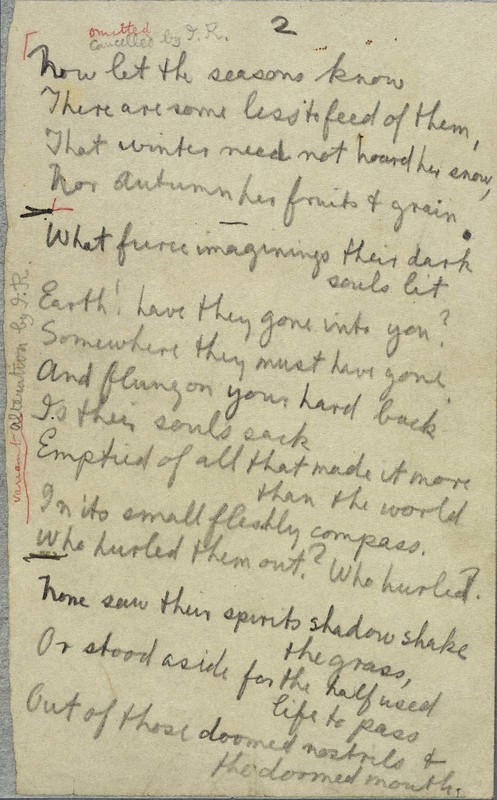 |
2
omitted [Now let the seasons know What fierce imaginings their dark None saw their spirits shadow shake |
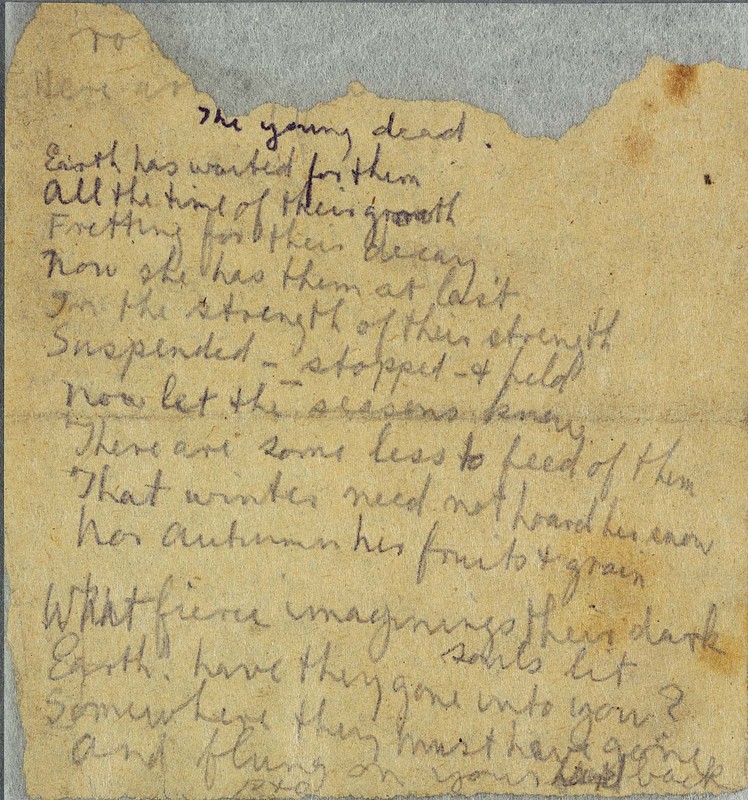 |
ro Here ar The young dead. Earth has waited for them What fierce imaginings their dark |
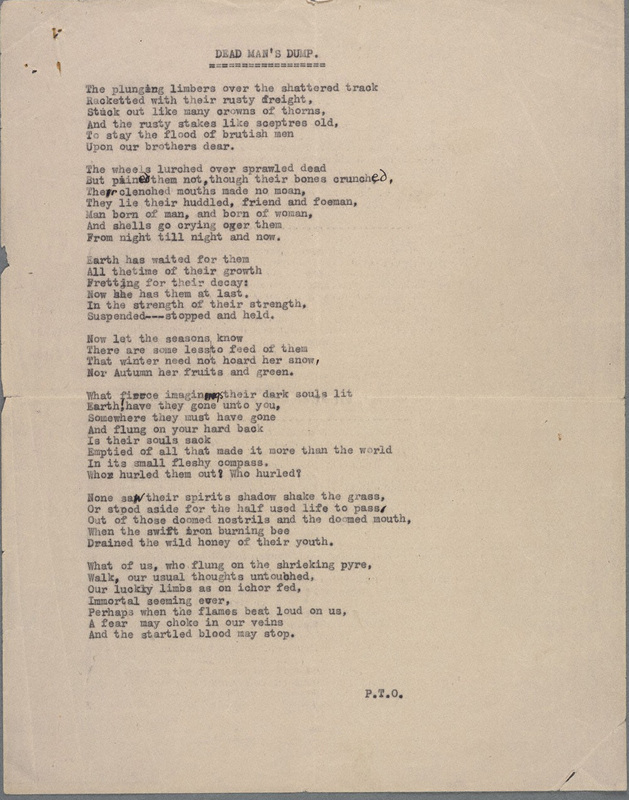 |
DEAD MAN'S DUMP =============== The plunging limbers over the shattered track The wheels lurched over sprawled dead Earth has waited for them Now let the seasons know What fierce imagin[?]\ings/ their dark souls lit None sa[?]\w/ their spirits shadow shake the grass, What of us, who flung on the shrieking pyre, The air is loud with death,
P.T.O. ([?]\C/ontinued) Maniac Earth\!/ howling and flying, your bowel A man's brain splattered on, Burnt black by strange decay Here is one not long dead, Will they come? Will they ever come? ========================= |
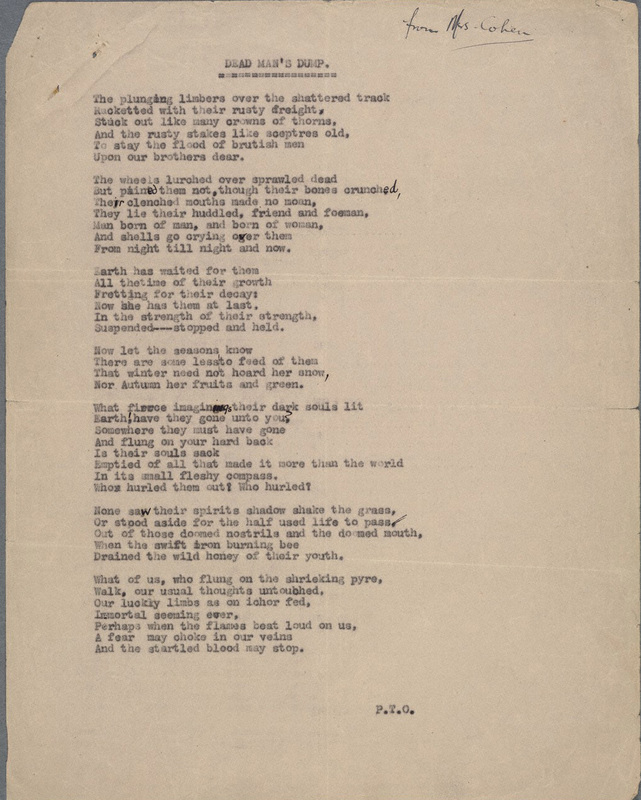 |
from Mrs Cohen
DEAD MAN'S DUMP The plung[?]\i/ng limbers over the shattered track The wheels lurched over sprawled dead Earth has waited for them, Now let the seasons know What fierce imagin[g]\ings/ their dark souls lit None sa[y]\w/ their spirits' shadow shake the grass, What of us, who flung on the shrieking pyre, P.T.O. ([?]\C/ontinued) Maniac Earth\!/ howling and flying, your bowel A man's brains splattered on, Burnt black by strange decay Here is one not long dead. Will they come? Will they ever come? =============================== |
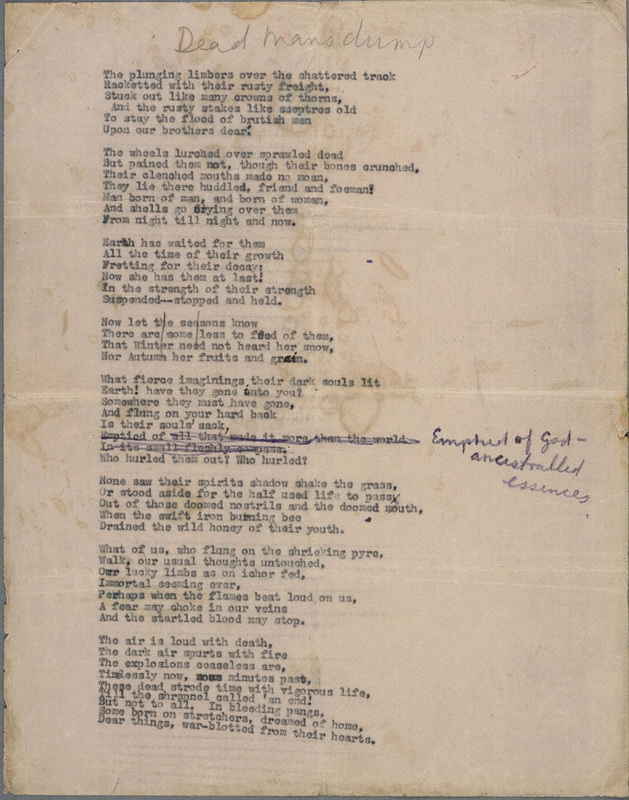 |
Dead mans dump
The plunging limbers over the shattered track The wheels lurched over sprawled dead Ear[h]\t/h has waited for them [Now let the seasons know What fierce imaginings their dark souls lit None saw their spirits shadow shake the grass, What of us, who flung on the shrieking pyre, The air is loud with death, // Maniac Earth! howling & flying, your bowel
A man's brains splatte\r/d on Burnt black by strange decay, Here is one not long dead, Will they come[!]\?/ Will they ever come? |
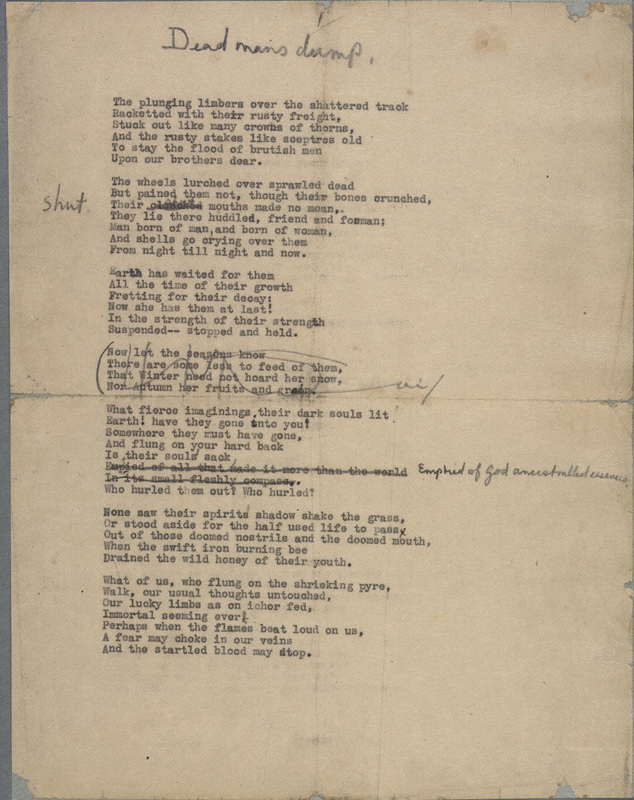 |
1
Dead mans dump. The plunging limbers over the shattered track The wheels lurched over sprawled dead Ear[??]\th/ has waited for them [Now let the seasons know What fierce imaginings their dark souls lit None saw their spirits shadow shake the grass, What of us, who flung on the shrieking pyre, // 2 The air is loud with death, A man[!]\'/s brains splattered on They left this dead with the older dead, Burnt black by strange decay, Here is one not long dead; Will they come? Will they ever come? Isaac Rosenberg |
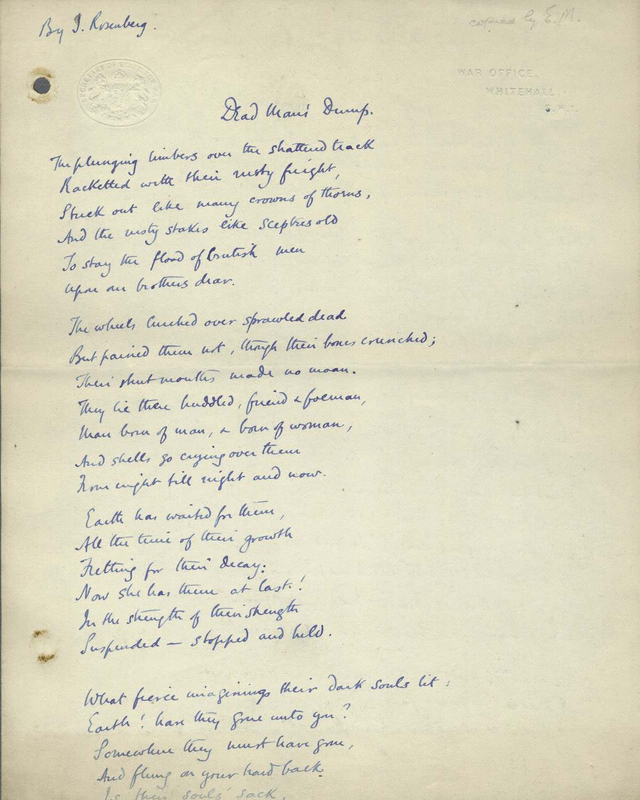 |
By I. Rosenberg
Dead Man's Dump. The plunging limbers over the shattered track The wheels lurched over sprawled dead Earth has waited for them, What fierce imaginings their dark souls lit // Emptied of God-ancestralled essences. None saw their spirits' shadow shake the grass, What of us who, flung on the shrieking pyre, The air is loud with death, A man's brains spattered on They left this dead with the older dead, Burnt black by strange decay Here is one not long dead; "Will they come? Will they ever come?" |
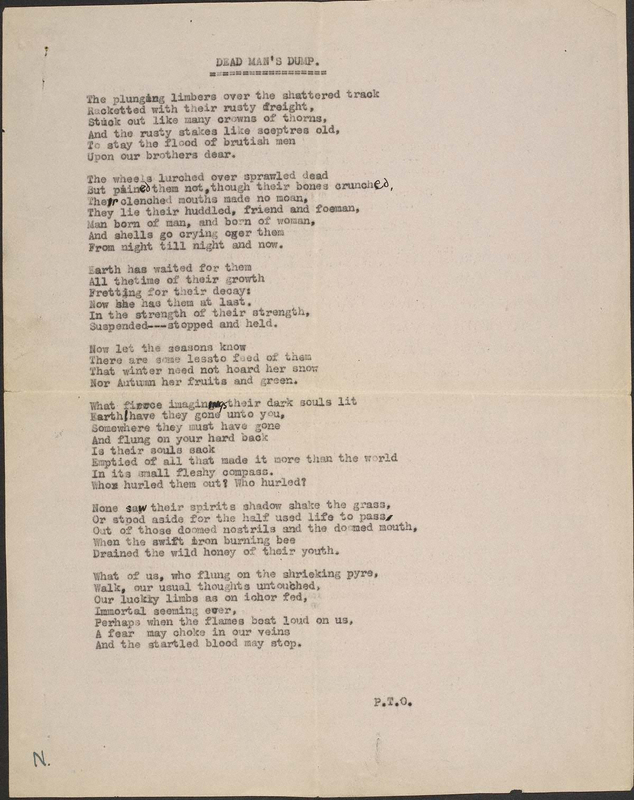 |
DEAD MAN'S DUMP v=============== The plunging limbers over the shattered track The wheels lurched over sprawled dead Earth has waited for them, What fi[??]\er/ce imagin[g]\ings/ their dark souls lit None sa[y]\w/ their spirits shadow shake the grass, What of us, who flung on the shrieking pyre, P.T.O. N. ([?]\C/ontinued) Maniac Earth\!/ howling and flying, your bowel A man's brains splattered on, Burnt black by strange decay Here is one not long dead, Will they come? Will they ever come? =============================== N. |
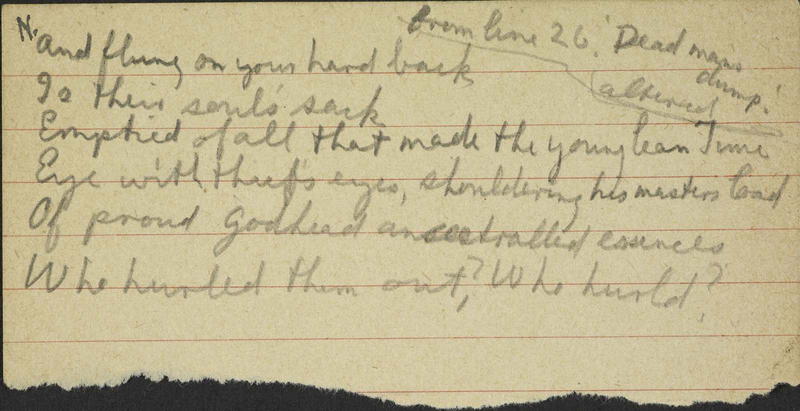 |
N. /from line 26. 'Dead man's dump.' altered ----------------------------------- And flung on your hard back Is their soul's sack, Emptied of all that made the young lean Time Eye with thief's eyes, shouldering his masters load Of proud Godhead ancestralled essences Who hurled them out? Who hurled? |
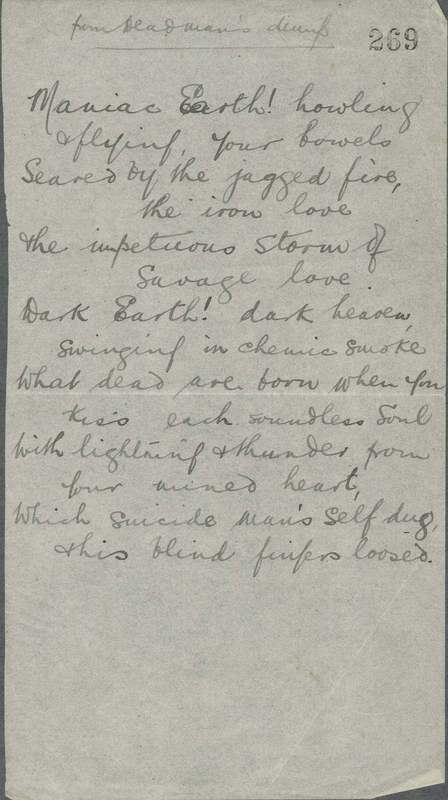 |
- First page instructs Marsh to include a missing paragraph before 'a man's brains splattered (on second page'
// from Dead man's dump Maniac Earth! howling |
Stage IV: Compare your Edition
You can now compare your edition with the published one that appears in Vivien Noakes's (ed.) The Poems and Plays of Isaac Rosenberg (OUP, 2004), pp. 139-142 (with notes pp. 367-9). Noakes observes that 'No complete MS has been traced' and she elects to choose the typescript MSF (correctly IR/I/263-4) as her base. Clearly she views this as the latest typescript (the fourth one).
DEAD MAN'S DUMP
The plunging limbers over the shattered track
Racketed with their rusty freight,
Stuck out like many crowns of thorns,
And the rusty stakes like sceptres old
To stay the flood of brutish men
Upon our brothers dear.The wheels lurched over sprawled dead
But pained them not, though their bones crunched,
Their shut mouths made no moan,
They lie there huddled, friend and foeman,
Man born of man, and born of woman,
And shells go crying over them
From night till night and now.Earth has waited for them
All the time of their growth
Fretting for their decay:
Now she has them at last!
In the strength of their strength
Suspended - stopped and held.What fierce imaginings their dark souls lit
Earth! have they gone into you?
Somewhere they must have gone,
And flung on your hard back
Is their soul's sack,
Emptied of God-ancestralled essences.
Who hurled them out? Who hurled?None saw their spirits' shadow shake the grass,
Or stood aside for the half used life to pass
Out of those doomed nostrils and the doomed mouth,
When the swift iron burning bee
Drained the wild honey of their youth.What of us, who flung on the shrieking pyre,
Walk, our usual thoughts untouched,
Our lucky limbs as on ichor fed,
Immortal seeming ever?
Perhaps when the flames beat loud on us,
A fear may choke in our veins
And the startled blood may stop.The air is loud with death,
The dark air spurts with fire
The explosions ceaseless are.Timelessly now, some minutes past,
These dead strode time with vigorous life,
Till the shrapnel called 'an end!'
But not to all. In bleeding pangs
Some borne on stretchers dreamed of home,
Dear things, war-blotted from their hearts.A man's brains splattered on
A stretcher-bearer's face;
His shook shoulders slipped their load,
But when they bent to look again
The drowning soul was sunk too deep
For human tenderness.They left this dead with the older dead,
Stretched at the cross roads.Burnt black by strange decay
Their sinister faces lie
The lid over each eye,
The grass and coloured clay
More motion have than they,
Joined to the great sunk silences.Here is one not long dead;
His dark hearing caught our far wheels,
And the choked soul stretched weak hands
To reach the living word the far wheels said,
The blood-dazed intelligence beating for light,
Crying through the suspense of the far torturing wheels
Swift for the end to break,
Or the wheels to break,
Cried as the tide of the world broke over his sight.Will they come? Will they ever come?
Even as the mixed hoofs of the mules,
The quivering-bellied mules,
And the rushing wheels all mixed
With his tortured upturned sight,
So we crashed round the bend,
We heard his weak scream,
We heard his very last sound,
And our wheels grazed his dead face.
Seminar Conclusion
In the course of this tutorial the manuscripts and typescripts have been referred to as A, B, C, etc. In reality they are as follows (MSS A-F are held in the Imperial War Museum, London):
- A IR/I/256 – 'Pencil draft, numbered '2' by Isaac Rosenberg. Contains 4 unused lines, 20-25, one unused line, 26-29. The corrections in red crayon and pencil are by Gordon Bottomley.
- B IR/255a and 255b – 'Pencil draft with one pencil alteration of incomplete poem entitled 'The Young Dead', later incorporated into 'Dead Man's Dump' as lines 14-19, followed by four unused lines, then lines 20-24, remainder unused. Paper torn prior to use by Isaac Rosenberg.
- C IR/I/257 – 'Second page of typed manuscript on pink paper corrected in ink by Isaac Rosenberg. Contains lines 48-79. Possible word mistakes may be the result of dictation to a typist; Isaac Rosenberg has corrected these in ink.
- D IR/I/259 – 'Second Typescript on pink paper with corrections by Isaac Rosenberg in ink. 'from Mrs. Cohen' written in ink in the top right corner. First page contains title, lines 1-19, four unused lines, 20-25, one unused line, 26-38. Possible word mistakes may be the result of dictation to a typist.
- E IR/I/261 – 'Third Typescript of two pages on pink paper corrected in ink with pencil alternatives. Title in pencil. Page one contains lines 1-19, 4 lines crossed through in pencil, 20-24, two unused lines cancelled in pencil with the alternative 'Emptied of God-ancestralled essences.' written in the margin, 26-47.
- F IR/I/263 – 'Fourth Typescript on pink paper, title in pencil with pencil alterations, with some questions as to punctuation changes in lines 20 and 21. The pages are numbered in ink by Annie Rosenberg. In the four cancelled lines 'grain' has been corrected to 'green' by Isaac Rosenberg.' This is the base text that Vivien Noakes uses for her edition.
- G IRNYPLBERG1223u – 'Copy of May 1917 version of poem in unknown hand. No complete manuscript version of the poem exists.' This is held in the Berg Collection at the New York Public Library.
- H British Library (BL) Rosenberg letters I512E 20/6/1917 – 'Typescript of poem with correction in pen. Included with letter to Gordon Bottomley dated 20th June 1917 describing pleasure at having received a letter from Gordon Bottomley praising the poem 'Daughters of War'.
- I BL Rosenberg letters I512E 20/6/1917 'Pencil alterations from line 26 written on lined scrap paper in Isaac Rosenberg's hand. Included with letter to Gordon Bottomley noted above (MS H).
- MS Marsh Letter to Edward Marsh discussing the poem, dated 3rd June 1917.
Author: Dr. Stuart Lee, 2009; Revised 2021



